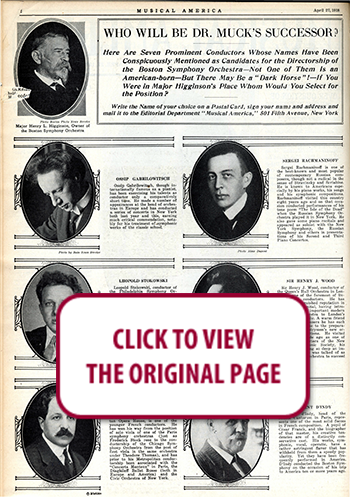 100 YEARS AGO IN MUSICAL AMERICA (238)
100 YEARS AGO IN MUSICAL AMERICA (238)
April 27, 1918
Page 2
WHO WILL BE DR. MUCK’S SUCCESSOR?
Here Are Seven Prominent Conductors Whose Names Have Been Conspicuously Mentioned as Candidate for the Directorship of the Boston Symphony Orchestra—Not One of Them Is an American-born—But There May Be a “Dark Horse”!—If You Were in Major Higginson’s Place Whom Would You Select for the Position?
OSSIP GABRILOWITSCH
Ossip Gabrilowitsch, though internationally famous as a pianist, has been exercising his talents as conductor only a comparatively short time. He made a number of appearances at the head of orchestras in Europe and has conducted a series of concerts in New York both last year and this, earning much critical commendation, notably for his treatment of symphonic works of the classic school.
SERGEI RACHMANINOFF
Sergei Rachmaninoff is one of the best-known and most popular of contemporary Russian composers, though not a radical in the sense of Stravinsky and Scriabine. He is known to Americans especially by his piano works, his songs and his symphonic compositions. Rachmaninoff visited this country eight years ago and on that occasion conducted performances of his tone poem “The Isle of the Dead” when the Russian Symphony Orchestra played it in New York. He also gave some piano recitals and appeared as soloist with the New York Symphony, the Russian Symphony and others in presentations of his Second and Third Piano Concertos.
LEOPOLD STOKOWSKI
Leopold Stokowski, conductor of the Philadelphia Symphony Orchestra, is one of the youngest leaders of an important symphonic orchestra. From the organ-bench at St. Bartholomew’s Church, New York, he was chosen as conductor of the Cincinnati Symphony Orchestra, holding that position for a number of years. He was chosen conductor of Philadelphia’s symphony orchestra upon his resignation from the Cincinnati Orchestra. As conductor of the Philadelphia Orchestra he has added considerably to his reputation, accomplishing among other things the feat of conducting Mahler’s “Eighth Symphony,” “The Symphony of a Thousand,” a few years ago, without a score.
SIR HENRY J. WOOD
Sir Henry J. Wood, conductor of the Queen’s Hall Orchestra in London, is one of the foremost of living British conductors. He has made a distinguished reputation in the English capital, having introduced the most important modern works for orchestra to London’s music-loving public. A warm friend of English composers he has each year devoted time to the preparation of his countrymen’s new orchestral compositions. He visited America a decade ago as one of the guest-conductors of the New York Philharmonic Society, his conducting making so deep an impression that he was talked of as coming to this orchestra to succeed Gustav Mahler.
PIERRE MONTEUX
Pierre Monteux, now conductor of French opera at the Metropolitan Opera House, is one of the younger French conductors. He has won his way from the position of solo viola of one of the Paris symphony Qrchestras (just as Frederick Stock rose to the conductorship of the Chicago Symphony Orchestra from the post of first viola in the same orchestra under Theodore Thomas), and has prior to his Metropolitan conductorship been associated with the “Concerts Monteux” in Paris, the Diaghileff Ballet Russe (both in Europe and America) and the Civic Orchestra of New York.
VINCENT D’INDY
Vincent d’Indy, head of the Schola Cantorum in Paris, represents one of the most solid forces in French composition. A pupil of César Franck, and 1the biographer of that master, his creative tendencies are of a distinctly conservative cast. His works, symphonic, vocal, operatic, have a rather astringent flavor that has withheld from them a speedy popularity. Yet they have been frequently performed in America. D’lndy conducted the Boston Symphony on the occasion of his trip to America ten or more years ago.




 RENT A PHOTO
RENT A PHOTO





